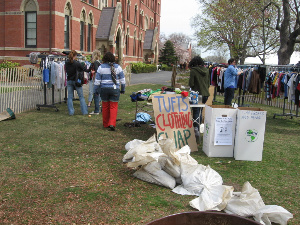
- Photo by Carrie Stanziola
By Carrie Stanziola
On April 22nd, Tufts students gathered to display their commitment to and curiosity about green living. Against the backdrop of a university band, students learned about, among other things, Tufts’ community garden and posed with cardboard signs demanding clean energy. Pictures were then taken of the students, and will be sent to government officials.
One of the most impressive campus initiatives was the Tufts’ bike share, spearheaded by Oren Sharebi. Anyone with a Tufts ID is welcome to participate. The first time, participants are required to sign a waiver. Students and faculty alike can borrow the bikes for up to eight hours at a time, and, as long as they lock up the bikes, they should remain secure. Sharebi adds that they are still “troubleshooting”, but the bike share is overall going pretty well, and that he hopes to maintain it throughout the summer and next semester.
Emily Ruff was in charge of the clothing swap, a Tufts’ tradition for two years. The idea is to get students to donate the clothes they don’t want so the clothes don’t go into a landfill. Moreover, people receive clothes to supplement their wardrobes without having to buy things from stores, as producing clothes is energy-intensive and not environmentally friendly. The clothing swap is completely free, and “College students don’t like to have to pay money for anything anyways,” she adds. By the early afternoon, students had gone through a lot of clothes and were still bringing them. Ruff mentions people are confused that they get to take the clothes for free, but when they take a piece of clothing they are “really happy about it.” The swap, she said, inspires people to give and refresh their wardrobes in an eco-friendly way.
The food, grilled vegetables and sausage, had been obtained through what one student termed “dumpster diving”, though not from the surplus of Tufts’ cafeteria. Dumpster divers, sometimes known as “freegans” typically look for fruits and vegetables in the dumpsters of supermarkets and restaurants that have been thrown out because they are bruised or past their expiration date. Far from being strictly a local movement, dumpster divers can be found in such diverse locals as France and South Korea. One food that can always be found is bread, as bakeries dispose of each batch daily. To help illustrate this fact, loaves were in abundance at Tufts’ Earth Day to demonstrate this example of waste.
Seeing Tufts students so involved in environmental causes calls to mind the quote of famed anthropologist Margaret Mead: “Never doubt that a small group of thoughtful, committed citizens can change the world. Indeed, it is the only thing that ever has.”













Reader Comments